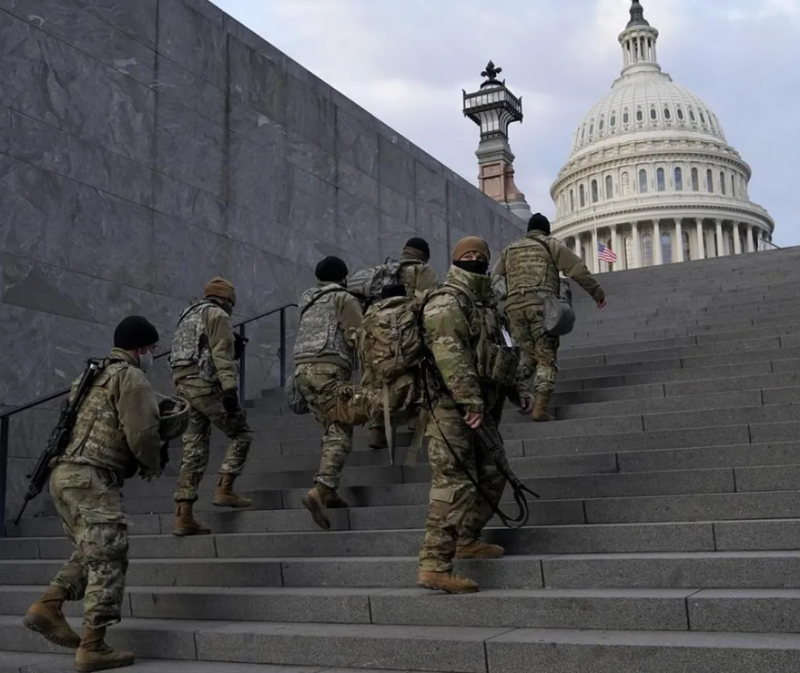
WASHINGTON: There are concerns that in the coming years, Army National Guard units across the country may not be able to meet military requirements for overseas and other deployments because soldiers are joining the Army National Guard at a faster rate than they can expect. are leaving.
As for individual states, some are falling short of their troop totals this year while others may do better. States rely on their guard members for a variety of missions. However, the loss comes at a time when dealing with several hectic hurricane seasons, fires in the West, and the constant need for troops to serve overseas on training missions for countries concerned with war tours in Syria and Russian threats in Europe. are.
Officials claim that in the past year, more soldiers have retired or joined the Guard, for an annual net loss of about 7,500 service members. The reduction in recruitment and the increase in the number of soldiers who choose not to enlist again after the end of their tour are the main reasons for this issue.
Also Read: US and UK conduct a drone exercise in the Arabian Gulf following Iran seizure
The loss signals a major personnel crisis affecting the entire US military, as all branches of the armed forces struggle to meet recruitment targets this year. They also highlight the need for sweeping changes to the Army's recruitment and retention practices for civilian soldiers and airmen, who must combine their civilian full-time jobs with their military obligations.
The Army National Guard's chief of staff, Major General Rich Baldwin, said current staffing issues are the worst they have been in the past 20 years, but the impact on the Guard's preparedness has so far been "minimal and manageable."
But if we don't address the issues of recruitment and retention, he warned, "over the next year or two, we will start to see preparedness issues related to strength emerge within our units."
The head of the National Guard Bureau, General Daniel Hokanson, claims that both the Army and Air Guard fell short of their targets in the fiscal year that ended last Friday. The authorized strength of the Army Guard is 336,000, and that of the Air Guard is 108,300.
Baldwin claimed that while the Army Guard ended the fiscal year about 2% short of its target, it had started the year with slightly higher than its target total. A 10% reduction in the number of current soldiers who opted to re-enlist contributed to that decline. According to Hokanson, the Air Guard fell short of its overall target by about 3%.
There are many reasons. However, according to Guard officials, the call to service for young people may not be as strong as it was after the September 11, 2001 attacks, when the United States was at war in Iraq and Afghanistan.
According to Baldwin, states began to experience more than anticipated personnel losses as operations in Iraq and Afghanistan began to shut down several years ago. He claimed that during the exit interview, the soldiers gave various reasons for not re-recruiting. Baldwin said that he enlisted the Army Guards not to pursue a career, but to serve his country, but "unexpectedly, he found a cause common to many of his soldiers, based on the assumption that That the war was over."
The same could apply today, he said. Guard members were involved in a variety of domestic emergencies in 2020 and 2021, including medical care, COVID-19 testing and vaccinations. These emergencies ranged from natural disasters and civil unrest to pandemics.
Also Read: Who is Jesus Manuel? Who killed 4 members of Sikh family in US
According to Baldwin, the pace of our overseas deployment is now much slower than before, and almost all COVID support missions have been scaled back. We come together to serve others and be part of something greater than ourselves. Both our soldiers and the civilians we're trying to recruit can assume that we've outgrown all that and that it's time to take advantage of the competitive job market.
Despite the small percentage of reduction for 2022, the Guard will experience increasing losses next year as a result of the US military's mandate that all soldiers receive the COVID-19 vaccine. About 9,000 members of the Guard are currently refusing to receive shots, and an additional 5,000 have asked for religious, medical or administrative exemptions.
So far no guard member has been expelled for disobeying vaccination orders. Final instructions from the Army to proceed are awaited by the National Guard. Officials have said it is not clear when they will receive the advice.
Guard leaders are looking for strategies to persuade service members to enlist or reenlist in the military given the likelihood of future losses. Providing Guard members with healthcare coverage, according to Hokanson, would be a crucial change. Approximately 60,000 Guardsmen do not currently have health insurance, he claimed.
And when they are in active-duty status, people who have insurance through their civilian employer must go through a challenging transition process to switch to the military's TRICARE programme.
He estimated that it would cost $719 million a year to provide those without health insurance with it.
Also Read:US 'concerned' about Yemen ceasefire breaking down; unsure if Iran is to blame
He added that adding educational benefits and rewarding Guard members financially for bringing in new recruits are other changes that might be beneficial. Although these bonuses were utilised at the height of the Iraq and Afghanistan wars, Hokanson and others claimed that there were some issues that could be resolved now.
In light of the current environment, Hokanson said, "We need to make adjustments because, in the long run, our country needs a National Guard the size that we are, or perhaps even larger, to meet all the requirements that we have." It is our responsibility to fill our formations so that they are ready for use when our country needs us.